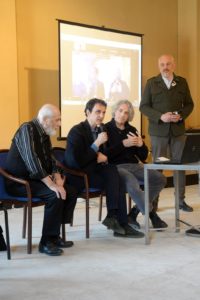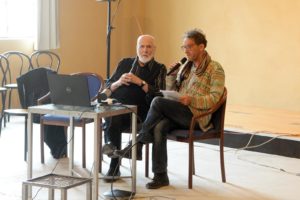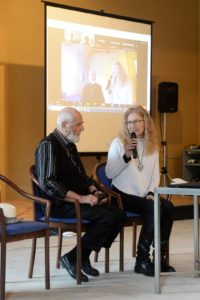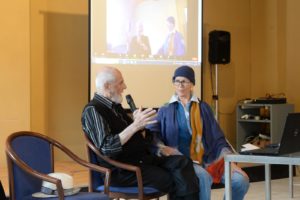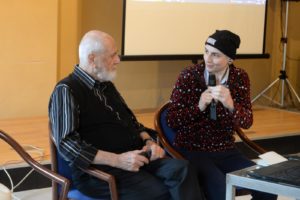Michelangelo Pistoletto at the Annual Meeting of the Rebirth/Third Paradise Ambassadors
Sala Cervo, Cittadellarte, 23 March 2024
Moderator Francesco Saverio Teruzzi
Michelangelo Pistoletto
At night my mind keeps thinking and creating on the basis of what has happened in the previous days or what I think will happen the next day. So in order not to forget my ideas when I wake up, I have a pen and paper on the bedside table and write ‘pizzini’. Today’s ‘pizzino’ is the following and it is for you all:
Welcome home, to Cittadellarte, which is the parental home of a big family.
A family of families.
The embassies are the families of the big family that regenerates and re-articulates society.
Family is for me a fundamental concept, as in the past it has always given meaning to society. Culturally, economically and socially, the first rural and then evolved family has always been at the centre of the organisational system. The earliest community systems were founded on the principles of families, which is why they are a model for social organisations.
With the transition to industry, each person got their own job and salary, becoming de facto autonomous.
But in this autonomy the concept of the traditional family and of being together was lost, and political parties have tried to convey it into ideas and ideologies that could replace the organic reality of the family. Ideologies are families, ideological families.
But today’s reality leads us to reconsider and regenerate the concept of the family as a harmonious place, based on love and mutual relationship and respect, on considering each other.
A harmony that we find in the demopratic concept, in which the union between people is not based on ideology, but on everyday practices.
Practices, carried out by industries, organisations and businesses, connect families in what are real centres of power autonomy. It is a true politics of togetherness. The minimum number of 2 necessary to make a family then applies to crafts, agriculture, industry, etc. The search for the logic of functional harmony is the very premise of a demopratic process based on the work groups we are going to develop today. Family groups, organic policy groups, which allow us to organise ourselves to then be a model for other organisations outside this meeting.
The Archipelago City is an example of this: it brings together the 74 municipalities that make up the province and has been recognised by UNESCO as a Creative City. Even if the recognition was formally awarded to Biella, it is the archipelago that can become the model of a family that has its children in the territory and, with the embassies, in society as a whole.
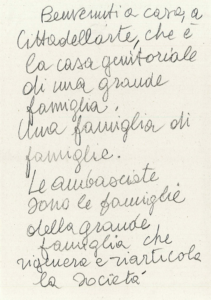
Michelangelo Pistoletto’s ‘welcome’ to the Rebirth/Third Paradise ambassadors.
Francesco Saverio Teruzzi
Michelangelo, I will be the first to ask you a question, then the Ambassadors of the Third Paradise will follow, who will have the floor by reserving their slot. A few days ago, at the United Nations, you spoke about the environment, sustainability and preventive peace, setting a double appointment: one, soon, with the Ambassadors delegated to the UN to talk about preventive peace, a term not so fashionable nowadays, and another on 21 March 2034 to see if the efforts to establish communities of practice will have had an effect. Coming back to us and the theme of the Ambassadors’ meeting: constitutions and constituents, what future do you see for us?
Michelangelo Pistoletto, Paolo Naldini, Antonio Sacco and Francesco Saverio Teruzzi.
Michelangelo Pistoletto
For me, the interesting part will be this afternoon, not when I speak, but when all the participants will sit around the tables and start talking, because that’s when the demopraxy will begin.
Today we will get in touch, this seems important to me, to get a basic idea of who we are, what we are, where we are going, etc.
Today we will see that the tools put in place for demopraxy will bring us back to being a family, not of blood, but of spirit, of connection, of politics, of social engagement and activation.
A super-family that today is set in motion on proposals and even criticism, but on ideas, which may well be unexpected and which we will discuss in order to identify solutions. Starting from the principle of 1 + 1, may we arrive not only at 3, but also at 4, 5, 6 and so on, at those ideas that we cannot probably formulate on our own, and never imposed by one on the others.
I would have liked all the Ambassadors to be here, but I am sure that those who are present will set an example and show that it is possible to find solutions through healthy shared discussion.
Davide Carnevale
Michelangelo has said several times that private individuals must come to have a public function, but we know on the one hand that the real goal of private individuals is not the common or public good, and on the other hand how difficult it is for those operating on the territories to share spaces and contents with the public as well, so my question is: how can we put the common good at the centre of social transformations?
Michelangelo Pistoletto and Davide Carnevale.
Michelangelo Pistoletto
This is a very useful question because it is the very concept of demopraxy that answers this question. Demos-practice, demos is the people, praxis is the practice.
It should be answered by Paolo (Naldini, editor’s note), who had the intuition to find a word to replace the concept of power, cratos, in democracy. Each one of us united with someone else making two produces something that is the practice of living, it is the family. Two people who want to be together have to take decisions on a daily basis, from who pays the electricity to how they arrange things in the house to what they eat and who cooks. Every single family, however it is formed, is a small government.
Then there are the governments of organisations, from the smallest like associations, artisan shops, small businesses, to industries, institutional and international organisations. Each organisation has its own autonomy and its own internal government. These various autonomous governments must then necessarily interact with each other, share space and time, finding agreements and common rules that allow to discuss at any level those topics that the small governments themselves recognise as indispensable. For example, energy: how do we obtain energy in a territory? Because energy is now a common problem. How do we get clean energy? How to ensure that it is sufficient, efficient and sustainable? It is from the sum and meeting of small governments that in the formula of creation 1 and 1 equals 3: the intentions of individual companies are added up and the proposal for a common future is found in the central void.
Paolo Naldini
When an organisation or company takes on issues of the common good as part of its strategies or policies, it is making public policy. We take as given and remain bound to a rigid dichotomy that is public and private, but the world is not like that. Recalling the 2030 Agenda as the backdrop to the first Demopratic Forum in 2015 in Cuba was strongly intended because it was a real public policy agenda, whether followed by the central government or by a cooperative or association. Communities of practice (as defined in the 1990s by Étienne Wenger) are set up that are not the actual absolute good, indeed they might even be against the law, and that is why we created not just an idea, but a concept, a vision and governance. Since it was born in Cittadellarte, we inserted it in other concepts and practices that were already part of us, and this is why, on the basis of the symbol of the Third Paradise, of the Formula of Creation, we find the balance and harmony that guarantee a balanced result through a method that confronts anything with its opposite.
Michelangelo Pistoletto
Mind you, to the question of how the private becomes public, we must also reply that the public needs every single private scheme understood precisely as a bearer of private initiative. When I had the chance to speak with the Cuban president, I brought precisely this example. Where everything is public, the absence of private initiative means that the public stands still too. The single private initiative, combined with that of another single and then a third, a fourth and so on, automatically becomes public policy.
The private party that aggressively absorbs the public is the private party that clings to the ideology of the public for personal gain alone, it does not want confrontation or the search for balance, it wants to maintain its own position.
Think about healthcare. Healthcare is a public right, for any part of any micro-government, but in it we have those who want to make the most profit at the expense of others through party and ideological powers. Healthcare must be one of the topics to be discussed and challenged. And it is the presence of a practice, of a methodology, that allows anything to be questioned, that can lead to the defusing of these private interests that have taken over the public function.
Paola Zanini
Seeing that we are talking about public and private; that I have been involved in art education for years; that we have a relatively newly appointed director at the Castello di Rivoli Museo d’Arte Contemporanea; that, like me, many of the Ambassadors present and not have continuous contact with schools and associations; that, as I am telling everyone, you recently attended the inauguration at UNESCO on Education and Peace with an interview in front of all the Ministers of Education of the 194 countries represented; I was wondering: how can we, together with you, ensure that both public and private education can pass on the principles that we promote with you, in which at the end we find the word ‘awareness’ which makes the difference and which we suggest to young and very young people, but which should be the real active proposal of those very ministers you met?
Michelangelo Pistoletto e Paola Zanini.
Michelangelo Pistoletto
We know that there is an art system that is completely separate from the society system. As far as I am concerned, everything changes. There is a willingness of art and the artist to take on social responsibility, which puts the individual in contact with other individuals, to move from individual authorship to creative co-authorship.
This change starts with schools, it starts with children, it starts with future people who will embrace music, visual arts, singing if they want to, but who will certainly take responsibility because they will be part of a society and an everyday art, an art that lives and an art of living, of being together, of communicating where there is no art system, in a real economy where the private component often risks becoming the deprivation of others. If this dimension in which art assumes all the responsibility that comes from the maximum freedom of the artist were already within everyone’s reach and shared by the ministers we spoke of earlier, then all this would not be necessary and we would already be a good step ahead… and yet here we are.
Cristina Gabetti
Through my work I brought, like you, the 2030 Agenda to the attention of the general public when very few knew what it was. We have unfortunately and very quickly fallen into ego, ideology and green washing, so much so that today many people attach the SDGs label to everything, and for this I, too, feel a bit responsible. Bearing this in mind, from your experience, what is the tool that we Ambassadors can develop in our activities to awaken a sense of belonging to humanity and to the good systems that give us life with their life, that is, going a bit upstream, what is it that can awaken a deep sense of belonging?
Michelangelo Pistoletto and Cristina Gabetti.
Michelangelo Pistoletto
I think that there are Ambassadors, some among us today, who focus on nature, on a really strong and powerful look at nature. Nature as the indispensable ingredient for the human being, as well as the other indispensable ingredient that is the metaverse, that is, the technological development that takes us all the way to artificial intelligence: we have artificial intelligence that has made its footsteps in an astonishing way that demonstrates the power that the human being has of getting through science to intangibility; on the other hand, if we do not have an equally powerful relationship with nature, the artificial part will destroy half of ourselves! We have to create this balance between nature and artifice and this requires, as you said, an awareness that we have to teach children, children in schools. We are half, we have enormous power, destructive and constructive, and we must know how to use it. Homo Sapiens is giving way to Homo Techno. But if Homo Sapiens lives off nature, Homo Techno feeds off Homo Sapiens in the sense that it needs electricity otherwise it could not live, and responsibility for the practical reality of existence. As an artist, I know that I have a sapiens leg and a techno leg, and it is on the balance of the two that I can move. I cannot just choose one or the other, today we are made of two components we cannot give up. Once there was agriculture, today there is technology in agriculture so the processes are accelerating, and if nature goes to ruin, it will not be alone. We are bringing degenerative acceleration to levels that are not only harmful but destructive. So if we want to continue moving forward in the intangible, we have to work very carefully.
Cristina Gabetti
But does Michelangelo Pistoletto have a formula allowing us to guarantee and protect this incredible wonder that is life?
Michelangelo Pistoletto
Maybe there are some very emotional formulas to achieve this, but certainly with education you can change everything, it has already happened in the past, but you need teachers, teachers who enthuse young people towards these issues.
Fortunato D’Amico
My question has already been answered. What is private is always public, the problem is how we activate the dichotomies. For example: if you have decided to dress in clothes that pollute, you have made a private choice that becomes public as a consumption choice. If there is consumption, there is production and whatever you privately produce has an immediate effect on the public. Every act of a private person becomes public if it can potentially affect another private person. Private and public are society, the problem lies in us identifying the former as just the bureaucracy or the latter as everyone thinking for themselves. Today’s manic society is a direct result of this split between public and private. The dichotomy is in constant contact and has no separation, and the very interaction between the parts is properly visible in the Third Paradise.
Michelangelo Pistoletto
What you just said is a perfect synthesis of what has been said so far, but then you have to see how this symbol can actually be applied in reality through a political understanding, a political understanding based on an ego-cultural, ego-physical and ego-cultural sensibility. It is about those questions that Max Casacci rightly posed in Subsonica’s song Terzo Paradiso: how will you dress? what will you eat? what will you think? how will you move?
These are the questions we have to answer with awareness in our activities.
The interesting thing is that I met Diaz Canel, the President of Cuba, where everything is public, and where we did the first Forum in 2015 with 100 referents, including small organisations that were not taken into account at all. Families, family groups, those involved in fishing, those involved in agriculture, those involved in schools, and they all came to meet and communicate. I told the President about this, about them, and asked him to make them so responsible for their relationship with each other that they became public. I said: you have a private sector that can become public by changing the relationship in which the public overpowers the private. A private that grows and controls from below, not to create a party with a group emerging and controlling everyone, but a private as private initiative, as an impulse for the economy.
Communism as a party with an absolute leader does not work, cannot work. And now we have it in Russia, albeit in a different way. The same system as in Soviet communism can be found in the Church, because in the Roman Catholic Church there is only one master and the priests are all salaried, they are employees and there is no private initiative, it is an imperial system.
On the other hand, monastic systems are part of a different society, born also as a defence against central systems, as are the brothers in the convents who meet in the chapter with their representatives of the various organisational parts (the kitchen, the garden, the market, the administration, etc.), and there they appoint a guardian who, despite having a management title, sees the value of his word as equal to that of any other brother whatever his function. They have even renounced the 8 per thousand in order to remain distinct from the Vatican, of course the latter is the copyright holder and the copyright is God, who’s quite important.
Fortunato D’Amico
To conclude what Michelangelo said, I would like to recall how in Italy the Church ranks first in the list of gathering places, and the apartment building second. It is an isolated element, but it is the place where one moves from the private to the public through common discussion and decision.
Michelangelo Pistoletto
And the apartment building itself shows how much commitment it takes to take a decision, because everyone must engage in choosing and deciding on something that will directly affect the private but collectively public individual. This is much more difficult than delegated centrality, because by delegating you leave decisions to someone else reserving the right to complain. Demopraxy is much more laborious and much slower, but if you prefer to delegate, at least you should not complain.
Jamila Campagna
I was very pleased to read this word: family. In recent years we have been trying to pursue a discourse on overcoming patriarchal society, and asking myself what the alternative system could be, I identified it in the family society, where above all we all come together. In the family there are children, the elderly, parents, siblings, it is a non-divisive and compartmentalised approach, where we help each other and the hierarchy is given by roles and tasks in a functional way. It is difficult to find another place where there are more situations, people, doing such different activities: in the office the office workers, at school the students, in the gym the athletes, etc. My question is: is it possible to overcome the matriarchal/patriarchal dichotomy by bringing the family system into society?
Michelangelo Pistoletto and Jamila Campagna.
Michelangelo Pistoletto
I believe that we have to restructure the family system on a cultural level. In the sense that people must be able to get back to being together as families and to do so in a profitable way. It is an act of creation that needs to be done to innovate the family system. Demopraxy involves getting together, being able to discuss, and overcoming that loneliness and isolation in which people find themselves today. We have gained autonomy, but we have lost it because we are alone. How do we take this autonomy and bring it back into the tradition? We find a solution in the trinamic symbol, where the family is the coming together of two people who in the central circle find their possibility of living together by coming to an agreement. It is thought that there is not only an element of physical attraction, of sexual attraction, but a cultural attraction too, which is very important. Talking to each other, perceiving each other, understanding each other, producing something precious that is fundamental to being together. It is the concept of creation that does not only apply to artists, but also to people who live together, and create and bring into the world not only a child, but a modus vivendi.
Francesco Moneta
I think that last year Michelangelo Pistoletto was the most ‘communicated’ Italian artist ever: the big birthday, two exhibitions, the book, the UN, the Venus of the Rags, an actual media overexposure of communication. Are you satisfied? And what communication goals do you set yourself for 2024?
Michelangelo Pistoletto
I am satisfied because the intention to stir waters is yielding results. But this should not be understood as a personal success, because with my work I have come to mirror society. I want this society I represent to benefit by acquiring awareness and competence in this relationship that I am developing between art and science. Because there is science within my reasoning on the existence, of this phenomenon that is at the origin of the Universe, i.e. the two elements – space/time and mass/energy – that randomly came together and gave rise to the Universe. A phenomenon that will eternally continue to work by uniting opposite and different elements that combine to give birth to everything that exists and then dies, in turn giving birth to something else. It is a way of thinking about human creation that derives from art, because art is creation. Arriving at the Formula of Creation together with the scientific basis of creation means not only performing a creative act, but offering the concept of creation to society, so that, through intelligence, all human beings can understand that they can experience the world in a conscious manner. The Formula therefore allows one to enter society not only to be part of it, but to co-create. I have been asked, “You want to change society with art, are you happy?” I am happy because while I am doing this, working, I already feel better, I would otherwise have to either get angry or submit. If we all did something, we would be happier and less angry.
Francesco Saverio Teruzzi
Just to be precise and to acknowledge the great work done under the coordination of Alessandro Lacirasella, there were 38 exhibitions and participations in exhibitions in 2023 alone.
Alberto Guggino
My question comes from an internal suffering due to the fact that we are living in great imbalance. How can we return to balance? We talk about artificial intelligence, forgetting about ‘artisanal’ intelligence; about public and private when in Italy we are witnessing a terrible privatisation of healthcare, with the poor paying all the costs. We are in the rich part of humanity and they make us believe that there are no resources. We take the resources away from the poor and allocate them to producing weapons. There is talk of reinstating military service. If you talk about peace you are an enemy. How to recover this balance? Our constitution is built on checks and balances precisely to create equilibrium, while we are facing an increasingly unbalanced reality instead. What can we do in our own small way? What paths do the masters follow? And what roads should teachers indicate for education, for teaching children?
Michelangelo Pistoletto
You said it all, and for that I applaud you. But you know what happened when we did the Mediterranean Table for Love Difference? They threw their differences overboard. We had started working with groups of artists on both sides of the Mediterranean. Organisational embryos were emerging, we were committed, something was happening. But it all fell apart with the Arab Spring. I don’t know, what can we do? The only thing to do is actually doing, being happy doing it, knowing that we have great powers against us. Hopefully, in this big family we’ll manage to put together elements that will then have some practical results country by country – because we cannot only theorise – and these results, added together, will change reality into a practical democracy.
Antonio Sacco
My question is very simple. I have been wondering a lot about the public and private discourse. For example how to impersonally affect what are very strong urgencies which, as has been said, also depend on knowing how to do and act, and on the power of knowing how to do and act with respect to a specific dimension, with respect to some very important issues that concern us all and that belong to the mechanisms of existence and coexistence with the Planet: air, water, earth, food resources, energy, i.e. the elements of matter that make up the existence of each of us. And how we lose ourselves in the impersonal to become something truly sacred and not remain elements that have a very small individuality, with something that reduces us to a need to somehow be separate from one another. I think that considering ourselves a part and maintaining a difference is a very important issue that has always been debated, and this issue, relating to existence itself and therefore to the elements that define it, is so important that I think we have to position ourselves in a completely different way. How can I make an impact in relation to public institutions if these are mostly clientelistic? It is a difficult relationship, because if I do not share the membership of a small group, I have to place myself in a different dimension, to shift the focus on something that is not individual, that is not based on making money, on something that belongs to everyone, which is the combination of the three intelligences: artificial intelligence, human intelligence, and – what we often forget – the intelligence of nature. Restoring balance in any way is therefore necessary in order to make us think differently as, for example, trees and plants do in considering themselves a relationship. And what do I gain from the relationship? The relationship is existence itself. It is not something different, it is this relationship. And all the separation with respect to you is this relationship that I must build, create, and share with you, stripping myself of my personal dimension. This is something I want to share with you precisely to strip myself of all personalism and build something.
Michelangelo Pistoletto
You need rules. You talk about personalism, but in order not to fall into chaos, you need rules. That is why I believe that new ‘ensembles’ must be created from this family of Ambassadors, creating a new concept or constitution. A constitution with even minimal rules, which would lead you to act consciously, with the ability to obtain a movement of circulation that would allow you to constitute a system, to create a repeatable political structure, which would not only be valid for the people who are here and speak Italian, but which would be extendable to the many Embassies we have around the world. If today we managed to put together a few ideas on which we can then build a sharable constitution, we will create something that can also be accepted by others. If not, what we do in our connection ends up crumbling if carried broadly. We must create something constituent.
Paolo Naldini
Redi and Monti, both anthropologists, talk about social genoma, I agree. Rossana Becarelli, whom I just saw coming in, teaches us the scientific and philosophical validity of the biome, whereby we are billions of individuals living together in an apparent single body. Mrs Thatcher once said that “there is no such thing as society, there are individuals”. We inherit these abstract entities that condition us like software and it is really difficult to make the mind work without that software.
So we stand to the individual as a person completely separated from others as in Thatcher’s theory. In life, we unfortunately happen to experience moments when we feel completely separated from others, from our affections and from the community, but they are moments of exchange with the opposite side, be it society, Italy, the nation, Biella, Milan, but no one ever blames Milan because there is no possibility to meet the person Milan. You meet more or less nice people and situations. So we must free ourselves, emancipate our minds, from ideological constructions that are functional to dominate us and, with this emancipation, build new concepts and identify and grasp what exists around us. The fact that we systematically live in organisations is not actually said or evoked, because there is a fear that we will become aware of it by assuming the power that is instead assumed by the delegated representatives. We do not need to delegate. Of course we will send a delegate to go to Brussels, but we will also go there together with communities of practice (e.g. Opera Demopratica Geneva). So, to answer Antonio, demopraxy and the processes of connecting the different organisations come into play to overcome the perverse communities of practice of the clientelistic system. What are mappings and forums if not systems for connecting processes and organisations that already exist in the territories and by that increasing their capacity for impact in the social system. Methods must be continually studied to develop this work of connecting and bringing together.
Michelangelo Pistoletto
I emphasise that we are not talking about an ideal system, but a system that we are adopting and that must be activated and recognised through an official and functioning constitution, not just an ideal one. We must create a constituent for a constitution featuring a state of art. Today, the state of art is not yet there. A state of art must be made of laws, because without laws we will only complain and say that we should… Demopraxy needs laws, because it is a political, practical system, and we must work to realise this constitution.
Linda Schipani
The art system. Art as an act of creation. A responsibility for those who create and the possibility of regeneration through art. My question is about the Reintegrated Apple, how did you arrive at the idea of the apple, a common fruit to represent, but with a historically important significance?
Michelangelo Pistoletto
The Reintegrated Apple is a symbol that stems from the idea of the Third Paradise. The first paradise is the one where the apple is completely intact and human beings are completely integrated with nature. These natural beings became artificial beings when they took a bite of the apple. We are immediately reminded of the Bible, but the Bible illustrates in pictures representative moments in history. The moment the apple was bitten, the concept of sin was born. And sin in this case seems almost a premonition for the level of degradation to which we have brought nature. With the symbol of the bitten apple, they had already guessed that man, taking his destiny and power into his own hands, would lead to destructive consequences for nature itself. The figure of the tempting devil was an extraordinary invention, who, by keeping saying “eat the apple”, “eat the apple”, led to the apple eventually being bitten and the technological apple effectively supplanting all that was natural in the apple itself. A natural system supplanted by an artificial system. The time has come to achieve a third stage, in which a balance between the two apples, natural and artificial, is found. We don’t want to go back to the primitive apple, none of us want to go back to being a beast: we want to save the human being, and to save the human being we have to be both nature, of which we are made, and artifice, of which we are also now made. So balance is the work of regenerating the apple represented by the mending done by today’s technology, science, human intelligence. Mending the damage by creating a new apple in which nature and artifice can live in balance.
Linda Schipani
Thank you, as in: art can.
Michelangelo Pistoletto
Art. The artist can be said to be symbolic, even if they don’t want to. Art always expresses and means something even if it is expressed in a completely abstract way. Art also means being free, it means many things.
Francesco Saverio Teruzzi
Thank you Michelangelo, thank you to the Ambassadors present and thank you also to all those who participated by following us remotely.

